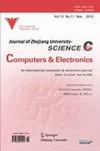Scientific articles recommendation with topic regression and relational matrix factorization
Journal of Zhejiang University-Science C-Computers & Electronics
Pub Date : 2014-11-01
DOI:10.1631/jzus.C1300374
引用次数: 2
Abstract
In this paper we study the problem of recommending scientific articles to users in an online community with a new perspective of considering topic regression modeling and articles relational structure analysis simultaneously. First, we present a novel topic regression model, the topic regression matrix factorization (tr-MF), to solve the problem. The main idea of tr-MF lies in extending the matrix factorization with a probabilistic topic modeling. In particular, tr-MF introduces a regression model to regularize user factors through probabilistic topic modeling under the basic hypothesis that users share similar preferences if they rate similar sets of items. Consequently, tr-MF provides interpretable latent factors for users and items, and makes accurate predictions for community users. To incorporate the relational structure into the framework of tr-MF, we introduce relational matrix factorization. Through combining tr-MF with the relational matrix factorization, we propose the topic regression collective matrix factorization (tr-CMF) model. In addition, we also present the collaborative topic regression model with relational matrix factorization (CTR-RMF) model, which combines the existing collaborative topic regression (CTR) model and relational matrix factorization (RMF). From this point of view, CTR-RMF can be considered as an appropriate baseline for tr-CMF. Further, we demonstrate the efficacy of the proposed models on a large subset of the data from CiteULike, a bibliography sharing service dataset. The proposed models outperform the state-of-the-art matrix factorization models with a significant margin. Specifically, the proposed models are effective in making predictions for users with only few ratings or even no ratings, and support tasks that are specific to a certain field, neither of which has been addressed in the existing literature.用主题回归和关系矩阵分解进行科学文章推荐
本文以主题回归建模和文章关系结构分析相结合的新视角,研究了网络社区中科技文章的推荐问题。首先,我们提出了一种新的主题回归模型——主题回归矩阵分解(tr-MF)来解决这个问题。tr-MF的主要思想是用概率主题建模对矩阵分解进行扩展。特别是,tr-MF引入了一个回归模型,通过概率主题建模来规范用户因素,该模型的基本假设是,如果用户对相似的物品集进行评分,则用户具有相似的偏好。因此,tr-MF为用户和项目提供了可解释的潜在因素,并为社区用户提供了准确的预测。为了将关系结构纳入到tr-MF的框架中,我们引入了关系矩阵分解。将tr-MF与关系矩阵分解相结合,提出了主题回归集体矩阵分解(tr-CMF)模型。此外,我们还将现有的协同主题回归(CTR)模型和关系矩阵分解(RMF)模型相结合,提出了具有关联矩阵分解(cr -RMF)模型的协同主题回归模型。从这个角度来看,tr- rmf可以被认为是tr-CMF的适当基线。此外,我们在CiteULike(一个书目共享服务数据集)的大量数据上证明了所提出模型的有效性。所提出的模型在很大程度上优于最先进的矩阵分解模型。具体来说,所提出的模型在对只有很少评分甚至没有评分的用户进行预测方面是有效的,并且支持特定于某个领域的任务,这两个问题在现有文献中都没有解决。
本文章由计算机程序翻译,如有差异,请以英文原文为准。
求助全文
约1分钟内获得全文
求助全文
来源期刊
自引率
0.00%
发文量
0
审稿时长
2.66667 months

 求助内容:
求助内容: 应助结果提醒方式:
应助结果提醒方式:


